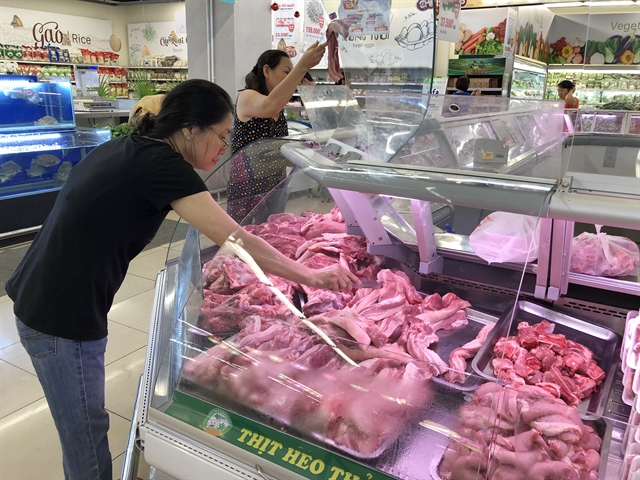 Economy
Economy


|
| Customers buy pork at a supermarket in HCM City. HCM City and localities in the southwestern region are enhancing co-operation to ensure supply of essential goods at stable prices. — VNS File Photo |
HCM CITY — HCM City will continue to work with southwestern cities and provinces to ensure an adequate supply of goods at stable prices, according to the city Department of Industry and Trade.
Nguyễn Quỳnh Trang, the department’s deputy director, said the programme had helped HCM City distributors and retailers find suppliers of quality products.
Trang spoke on Monday at a conference on the market stabilisation programme between the city and the southwestern region.
She said that manufacturers have been able to find steady outlets for their products, and as a result, have invested more in expanding production and improving product quality.
Annual conferences have brought together suppliers and buyers between HCM City and localities in the southeastern and southwestern regions. This has increased consumption of the two regions' goods in HCM City and exports via city-based firms.
Trang said the department would continue to co-operate with cities and provinces in the region to exchange information about goods supply and demand, and help firms create production and distribution links. It will also strengthen inspections to secure product quality.
“The city wants to enhance co-operation with the southwestern region, but localities also need to ensure stable product quality and quantity,” she said.
Pig prices
Trần Chí Dũng, head of the city's Department of Industry and Trade’s market management division, said: “This year, the prices of most food and foodstuff items in the city and the southwestern region have been stable, except pork.”
African Swine Fever (ASF) has seriously affected the local pig breeding sector, reducing pig herds by 30 per cent over last year.
Pig prices fell sharply from March to May to VNĐ28,000-VNĐ35,000 per kilo, but from June prices gradually rose and are up to 90,000 now, he said.
Nguyễn Minh Toại, director of Cần Thơ Department of Industry and Trade, said the increase in pig prices was a result of a supply shortage.
“Some large pig farms which were not affected by ASF raised their pig prices, make them VNĐ8,000-VNĐ10,000 more than the market price,” he said.
Trần Phương Nga, representative of Saigon Co.op, said that Saigon Co.op has participated in stabilising prices of nine commodity groups, including pork products.
“In the context of price fluctuations of pork and pork-based products due to ASF, Saigon Co.op needs close coordination from suppliers to keep prices stable, while management agencies from central to local levels need to prevent further increases, especially in the days before the Lunar New Year (Tết) holiday,” she said.
With Tết holiday approaching, demand for many other essential products, especially pork, will increase strongly.
Conference delegates agreed that besides calling on large pig farms and traders to keep prices stable, consumers should be encouraged to change their habit of buying fresh pork and instead buy chilled and frozen pork, and also increase the use of poultry meat and seafood.
Trang said to ensure pork supply, from the beginning of the year to December 10, businesses in the city imported nearly 14,000 tonnes of pork, an increase of over 150 per cent compared to the same period last year.
Poultry meat suppliers such as Ba Huân and San Hà have committed to increase supply by 30 per cent for Tết, she said.
At the conference, some provinces suggested that city-based businesses distribute imported pork to their areas. But Trang said these localities should first check their pork supply and demand to come up with appropriate measures to meet the market demand. — VNS




